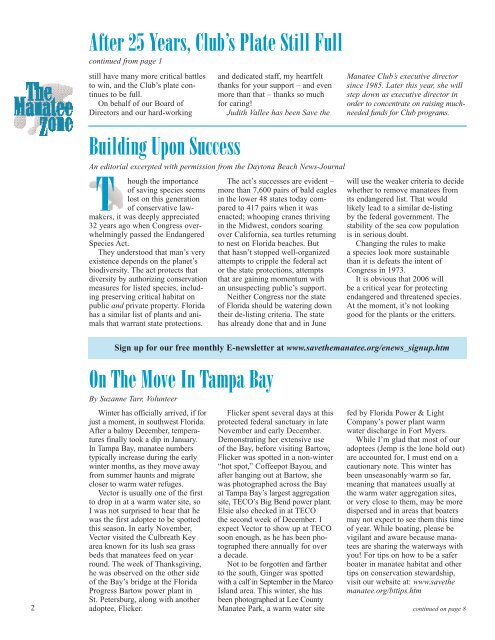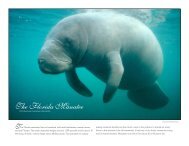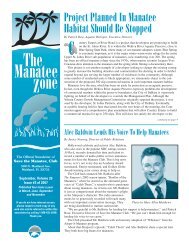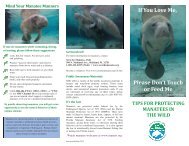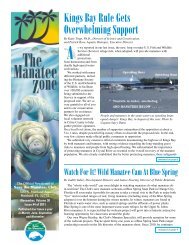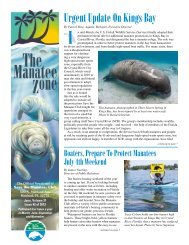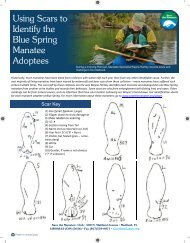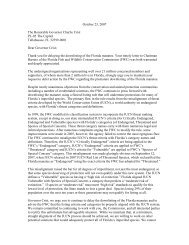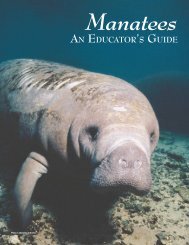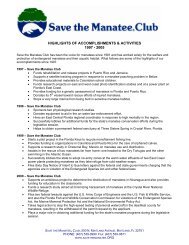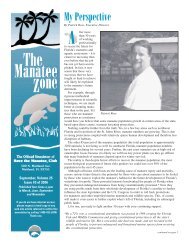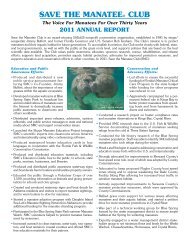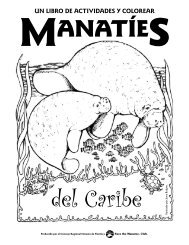T After 25 Years, Club's Plate Still Full - Save the Manatee Club
T After 25 Years, Club's Plate Still Full - Save the Manatee Club
T After 25 Years, Club's Plate Still Full - Save the Manatee Club
Create successful ePaper yourself
Turn your PDF publications into a flip-book with our unique Google optimized e-Paper software.
<strong>After</strong> <strong>25</strong> <strong>Years</strong>, <strong>Club</strong>’s <strong>Plate</strong> <strong>Still</strong> <strong>Full</strong><br />
continued from page 1<br />
still have many more critical battles<br />
to win, and <strong>the</strong> <strong>Club</strong>’s plate continues<br />
to be full.<br />
On behalf of our Board of<br />
Directors and our hard-working<br />
hough <strong>the</strong> importance<br />
of saving species seems<br />
lost on this generation<br />
of conservative lawmakers,<br />
it was deeply appreciated<br />
32 years ago when Congress overwhelmingly<br />
passed <strong>the</strong> Endangered<br />
Species Act.<br />
They understood that man’s very<br />
existence depends on <strong>the</strong> planet’s<br />
biodiversity. The act protects that<br />
diversity by authorizing conservation<br />
measures for listed species, including<br />
preserving critical habitat on<br />
public and private property. Florida<br />
has a similar list of plants and animals<br />
that warrant state protections.<br />
and dedicated staff, my heartfelt<br />
thanks for your support – and even<br />
more than that – thanks so much<br />
for caring!<br />
Judith Vallee has been <strong>Save</strong> <strong>the</strong><br />
Building Upon Success<br />
An editorial excerpted with permission from <strong>the</strong> Daytona Beach News-Journal<br />
T<br />
The act’s successes are evident –<br />
more than 7,600 pairs of bald eagles<br />
in <strong>the</strong> lower 48 states today compared<br />
to 417 pairs when it was<br />
enacted; whooping cranes thriving<br />
in <strong>the</strong> Midwest, condors soaring<br />
over California, sea turtles returning<br />
to nest on Florida beaches. But<br />
that hasn’t stopped well-organized<br />
attempts to cripple <strong>the</strong> federal act<br />
or <strong>the</strong> state protections, attempts<br />
that are gaining momentum with<br />
an unsuspecting public’s support.<br />
Nei<strong>the</strong>r Congress nor <strong>the</strong> state<br />
of Florida should be watering down<br />
<strong>the</strong>ir de-listing criteria. The state<br />
has already done that and in June<br />
<strong>Manatee</strong> <strong>Club</strong>’s executive director<br />
since 1985. Later this year, she will<br />
step down as executive director in<br />
order to concentrate on raising muchneeded<br />
funds for <strong>Club</strong> programs.<br />
will use <strong>the</strong> weaker criteria to decide<br />
whe<strong>the</strong>r to remove manatees from<br />
its endangered list. That would<br />
likely lead to a similar de-listing<br />
by <strong>the</strong> federal government. The<br />
stability of <strong>the</strong> sea cow population<br />
is in serious doubt.<br />
Changing <strong>the</strong> rules to make<br />
a species look more sustainable<br />
than it is defeats <strong>the</strong> intent of<br />
Congress in 1973.<br />
It is obvious that 2006 will<br />
be a critical year for protecting<br />
endangered and threatened species.<br />
At <strong>the</strong> moment, it’s not looking<br />
good for <strong>the</strong> plants or <strong>the</strong> critters.<br />
Sign up for our free monthly E-newsletter at www.save<strong>the</strong>manatee.org/enews_signup.htm<br />
2<br />
On The Move In Tampa Bay<br />
By Suzanne Tarr, Volunteer<br />
Winter has officially arrived, if for<br />
just a moment, in southwest Florida.<br />
<strong>After</strong> a balmy December, temperatures<br />
finally took a dip in January.<br />
In Tampa Bay, manatee numbers<br />
typically increase during <strong>the</strong> early<br />
winter months, as <strong>the</strong>y move away<br />
from summer haunts and migrate<br />
closer to warm water refuges.<br />
Vector is usually one of <strong>the</strong> first<br />
to drop in at a warm water site, so<br />
I was not surprised to hear that he<br />
was <strong>the</strong> first adoptee to be spotted<br />
this season. In early November,<br />
Vector visited <strong>the</strong> Culbreath Key<br />
area known for its lush sea grass<br />
beds that manatees feed on year<br />
round. The week of Thanksgiving,<br />
he was observed on <strong>the</strong> o<strong>the</strong>r side<br />
of <strong>the</strong> Bay’s bridge at <strong>the</strong> Florida<br />
Progress Bartow power plant in<br />
St. Petersburg, along with ano<strong>the</strong>r<br />
adoptee, Flicker.<br />
Flicker spent several days at this<br />
protected federal sanctuary in late<br />
November and early December.<br />
Demonstrating her extensive use<br />
of <strong>the</strong> Bay, before visiting Bartow,<br />
Flicker was spotted in a non-winter<br />
“hot spot,” Coffeepot Bayou, and<br />
after hanging out at Bartow, she<br />
was photographed across <strong>the</strong> Bay<br />
at Tampa Bay’s largest aggregation<br />
site, TECO’s Big Bend power plant.<br />
Elsie also checked in at TECO<br />
<strong>the</strong> second week of December. I<br />
expect Vector to show up at TECO<br />
soon enough, as he has been photographed<br />
<strong>the</strong>re annually for over<br />
a decade.<br />
Not to be forgotten and far<strong>the</strong>r<br />
to <strong>the</strong> south, Ginger was spotted<br />
with a calf in September in <strong>the</strong> Marco<br />
Island area. This winter, she has<br />
been photographed at Lee County<br />
<strong>Manatee</strong> Park, a warm water site<br />
fed by Florida Power & Light<br />
Company’s power plant warm<br />
water discharge in Fort Myers.<br />
While I’m glad that most of our<br />
adoptees (Jemp is <strong>the</strong> lone hold out)<br />
are accounted for, I must end on a<br />
cautionary note. This winter has<br />
been unseasonably warm so far,<br />
meaning that manatees usually at<br />
<strong>the</strong> warm water aggregation sites,<br />
or very close to <strong>the</strong>m, may be more<br />
dispersed and in areas that boaters<br />
may not expect to see <strong>the</strong>m this time<br />
of year. While boating, please be<br />
vigilant and aware because manatees<br />
are sharing <strong>the</strong> waterways with<br />
you! For tips on how to be a safer<br />
boater in manatee habitat and o<strong>the</strong>r<br />
tips on conservation stewardship,<br />
visit our website at: www.save<strong>the</strong><br />
manatee.org/bttips.htm<br />
continued on page 8


